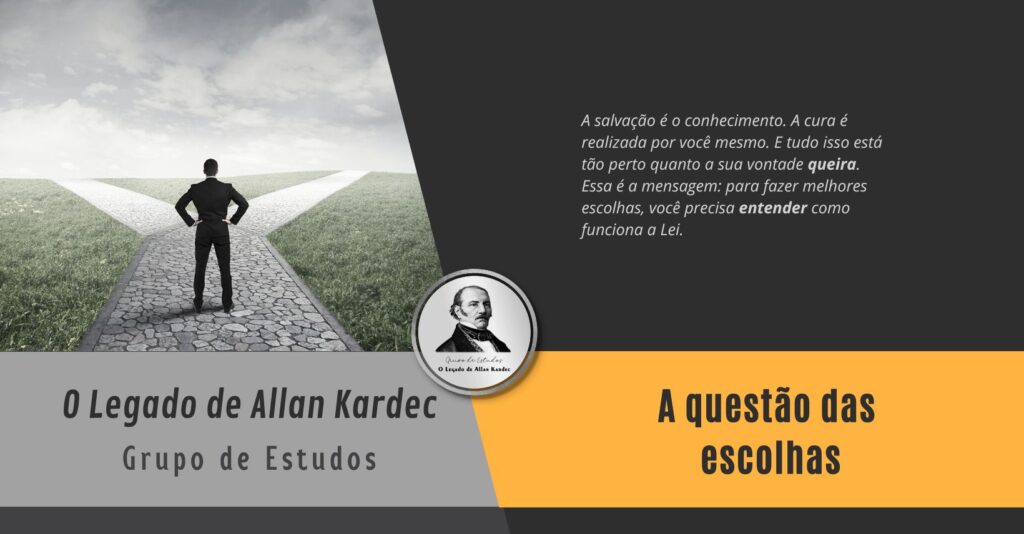Translations, from Portuguese, are automatic. If you notice any errors in the text, help us identify them, clicking here.
Subscribe to our Newsletters and receive our articles directly in your email.
Life is all about choices. Sometimes they are lucid choices, that is, we know very well that something is correct or not; other times, they are “ignorant” choices, that is, we don't know enough to assume the results. Of these, we can pick mistakes or successes and, in the case of error, there is no “sin”, because the error is part of evolution. As long as you don't get attached to it, "it's all right." Just move on and don't repeat the mistake. There is no condemnation, nor was there any evil purpose.
The big question is when the choice for what is wrong happens more consciously — and here I do not consider full conscience, because, if it existed, the bad choice would not be made. The individual, endowed with conscience and intelligence, acts in favor of attachment to what is wrong or that brings bad results. Yes, he acts enveloped in a confusion of ideas, which were born in the first place from his urge to satisfy himself in some respect — hence the assertiveness in saying that selfishness and pride are the mothers of all other imperfections — and, often, not even thinks of doing evil, but of satisfying his own desires or [false] needs. This is the problematic point of bad choices, where the individual condemns himself to a whirlwind of bad effects in which the cause is himself and no one else, and where he distances himself from the Good, which is the path, to take a detour that lasts forever. feathers will cost you to resume, as it requires the exercise of detachment.
That said, many will wonder: in both cases, but especially in the second, so how to make less mistakes? How can we better judge our own actions? How to avoid occasional mistakes and how to exercise detachment before a certain habit becomes a terrible imperfection?
Briefly, the answer is a rhetorical question: why do you think that the spirits of previously incarnated individuals — wise spirits and ignorant spirits; Kind spirits and evil spirits; Happy spirits and suffering spirits — did they take the time to tell us about their own adventures? Why do you think that an individual of sciences, dedicated philosopher of education and connoisseur of so many other sciences, having glimpsed something in these communications, dedicated, to exhaustion, about 14 years of his life, his finances, his joys, and your health in studying and disseminating this knowledge, which formed what we know as Spiritism or Spiritist Doctrine? WHY?
When the child sees his brother suffer a burn by putting his hand on hot coals, he will most likely think twice before doing the same. Imagine what an adult, full of his brain capabilities, can do with this knowledge?! And yet, how many people, going through years and years of foolishly cultivated suffering, CHOOSE to keep these works closed on the shelves, forgotten in their virtual places?
The passage of Zacchaeus, who, seeing Jesus pass by his door, climbed a tree to try to see him, without letting himself be seen interested by the citizens of the city, can be our same: just be interested. The difference is that we don't have to hide from anyone to read a book, except when WE CHOOSE our hiding from OURSELVES, out of a foolish fear of, seeing ourselves discovered by ourselves, having to carry out the correction movement. Well, at this point, if you act like that, I can already ask you: why do you like unhappiness so much?
Salvation is knowledge. Healing is done by yourself. And it's all as close as you want PLEASE. That's the message: to make better choices, you need to TO UNDERSTAND how the law works.
Happy new days to you.
Reading Recommendations (Books)
- Free PDFs by Kardec – https://bit.ly/3sXXBxk
- Autonomy – The Untold History of Spiritism: https://amzn.to/3PIvbyy
- Allan Kardec's Legacy: https://amzn.to/3RIn2gv
- Final point – the reunion with spiritualism with Allan Kardec: https://amzn.to/48PLaE7
- Neither Heaven nor Hell – The Laws of the Soul According to Spiritism: https://amzn.to/3F2voYO
- Genesis – Miracles and Predictions According to Spiritism (unadulterated): Free PDF or https://amzn.to/3RM91hF
- Heaven and Hell: Or divine justice according to Spiritism (unadulterated): Free PDF or https://amzn.to/3ZGrcal
- Spiritist Revolution. Allan Kardec's forgotten theory: https://amzn.to/3t7HIUH
- Mesmer. The denied science of animal magnetism: https://amzn.to/3PYc1X2
- The Book of Mediums: https://amzn.to/3PDNTHK
- The Spirits' Book: https://amzn.to/3QkcFx9
- Spiritist Magazine – complete collection: https://amzn.to/48Uxh7s
- Practical Instructions on Spiritist Manifestations: https://amzn.to/3QiR8Gc
- Spiritism in its Simplest Expression: https://amzn.to/3M6fXT5


